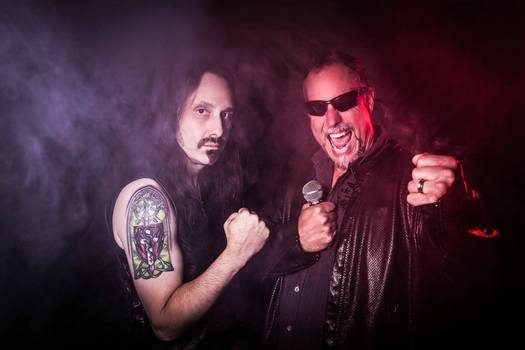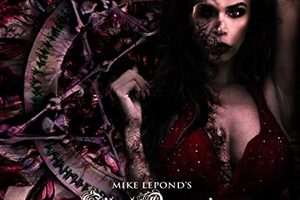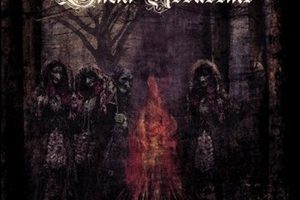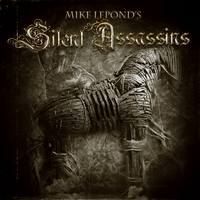Mike Lepond’s Silent Assassins – Classic Prophecy
Sunday, 28th January 2018
Best known for his work as the bassist for the neoclassical-oriented progressive metal band Symphony X, Mike Lepond has spread his wings into numerous bands and projects over the years. It would be difficult to list everything just in this intro (that’s what Metal-Archives is for), but suffice to say the man isn’t letting the grass grow underneath him while working on his next record. The second solo effort for Mike Lepond’s Silent Assassins Pawn and Prophecy is his latest release and another outstanding album for those who love the combination of classic metal music, soaring melodic vocals with grit and passion, and lyrical content that embraces mythology, history, and literature staples all rolled into the mix.
We were able to reach Mike by phone and his cordial, down to earth personality comes through as we engage in this interview. Beyond learning about the differences between the two Silent Assassins albums, we also talk about his views on social media use, the changing landscape of being a working musician in modern times, and of course some discussion on his other activities with Ross the Boss and Symphony X among other things.
Dead Rhetoric: Where do you see the major differences in Pawn and Prophecy versus the debut self-titled album? Did you feel more self-assured and aware of the songwriting and performances based on the acceptance from critics and fans of the debut?
Mike Lepond: Well, I think there’s not too much of a difference musically between the two. I think both (records) are classic heavy metal records. If I had to really dig in and think of some differences, on Pawn and Prophecy I experimented a little bit more. One of the songs is a folk song, which I had never done before- and of course the other big difference is a twenty-minute song I did on the record with some female singers. That was a big challenge as well.
As far as different things I did, when recording the first album usually you have a band and all the guys work together. But working all by myself, I made a lot of mistakes in the recording, so I learned how to do a lot of different things from the first album. Recording the second album was a lot smoother, because I kind of knew what I had to do this time.
Dead Rhetoric: In developing the epic title track which runs almost 22 minutes, how do you balance out the needs of the arrangement while hopefully ensuring that the listener is not bored or lost by the depth of the music on display- as it goes through Renaissance faire style nuances to 50’s-oriented rock swings beyond the metal themes?
Lepond: Right. When I was writing the song, that was the big challenge, and that was on my mind the whole time. How do you keep a listener interested for over twenty minutes? What I did to remedy that was, I made the song go in all different directions like you said. I took parts of the MacBeth play and tried to change the feel with every part, and with all different styles of music – you mentioned how I threw a blues part in there just to lighten things up in terms of the mood, throw people off a bit. I kept some riffs and themes would return from time to time to keep reminding the listener of what they had listened to. I made a big epic ending, and ending things on a happy note in the end. It took two years for me to put the whole thing together – I guess the media and the fans will be the judge of how well it turns out.
Dead Rhetoric: And how did you decide on all the guest vocalists for this cut?
Lepond: So the MacBeth play has many females in there- you have three female witches, and MacBeth’s wife. I thought it would be cool to have some female vocalists in there, it would be an interesting thing for the listeners. Throughout my years of touring with Symphony X, I’ve met so many singers along the way- and a lot of these singers I have played on their CD’s as well. When the time came for me to get some singers, I just called up friends of mine that I’ve helped out in the past, and I thought would do well on the song. I have a girl from Israel, another girl from Greece, and then two girls from the USA. That was fun, but a lot of work with all their schedules- in the end we got it all done and I like all of their performances.
Dead Rhetoric: Have you always admired Alan Tecchio’s vocal abilities prior to meeting him through your work together in Seven Witches back in 2010, especially growing up in the New Jersey scene with Hades?
Lepond: Yes, Hades was a really big band on the New Jersey metal/rock scene from the early 80’s on. We all knew Alan Tecchio- I had gone to see Hades a lot in the past. I always thought he had a really great voice. I never really got to meet him formally until we started jamming in Seven Witches together. That’s when I would see him a lot, I really began to admire his vocals greatly. He had a really cool style, he had a lot of power and grit in his voice. He could really sing clear, and I thought that would be good for what I was doing. When the time came to do a solo album, I called him up right away and it’s great because he only lives about 30 minutes away from me. He was totally into it, he did a phenomenal job.
Dead Rhetoric: You have a love of mythology and history that comes through in the lyrics. Do you remember what specific eras capture your attention, and what do you hope to get across to the listener through these stories?
Lepond: In general, when I was in high school I never cared about history. I’d say in the early 2000’s, I started really watching the History Channel, and I became fascinated with all these historical stories, mythology, and things from literature. I would watch this all the time. I realized these stories are so epic, they would go really great with heavy metal music. Thinking that way, I just started writing metal songs and the lyrics were from mythology, history, and literature- it was a perfect blend. For me personally, it made the songs very enjoyable because I could write some lyrics and think about what kind of mood was going on in this time period- maybe I would tailor the music to sound like those lyrics. Kind of like a mini-heavy metal soundtrack to each song.
As far as historical periods- I like it all really, it’s all fascinating.
Dead Rhetoric: Do you have any specific criteria that makes you pick and choose the bands or projects you work in? Is it a juggling act what takes priority between say Symphony X, Ross the Boss and your other live/studio work?
Lepond: Yeah, I always keep so busy and I am on so many metal projects. As far as the criteria, I tell the specific client, just send me what you have and I’ll listen to it. If I think it’s good, I’m happy to play on it. A lot of young bands starting out are so good, and they just can’t get any exposure. Maybe it’s not going to help them a ton with me on it, but maybe it will get other people to notice it, or one of my fans may happen to listen to it.
As far as all the work I do, it’s just a matter of staying organized. I have a routine where I wake up really early, I’m kind of an early bird. I’ll practice whatever song I need to record for a good solid 2-3 hours, and I keep up with it every day. I’m a workaholic, I love doing it, and every project is a challenge.
Dead Rhetoric: Being a working metal musician in modern times is much different than when you were going through the ranks. How do you navigate this challenging, ever-changing landscape while remaining level-headed and sane?
Lepond: Things are a lot different now. When I first I joined Symphony X in 1999, we’d sell records so we would be getting royalties and do well on tour. In recent years, unfortunately people are just not buying CD’s anymore. They are just listening to things on YouTube or Spotify, things like that- sales have gone in the tank, so bands now have to just keep touring to stay alive. Symphony X took a big hit on the sales as well, we especially took a big hit because it takes us a while to write records so we are not out there as much. I really needed to hustle more and jump on a lot of tours, jump on a lot of recordings to make up for the loss of income.
It’s tough out there for so many musicians, so many musicians have to be doing so many different things right now. It’s really hard and I don’t know where it’s going in the future.
Dead Rhetoric: Where do you see your role as a bassist – and how would you describe your outlook and philosophy when it comes to the instrument in heavy metal?
Lepond: The heavy metal bass player – I think we are underappreciated, in general. A big problem with heavy metal bass playing is on most records, you can’t even hear the bass. The guitar has a lot of low end in it, and erases the bass. You can kind of feel it, but you aren’t really hearing the clarity. What I did on my solo albums is I made sure the guitar sound did not have as much low end, just more mids and highs. So the bass could pop out on the low end.
As far as stylistically, what I do is I really pay attention to the drums. A lot more than I used to- I used to pay more attention to the guitar. I like being more rhythmic, as I get older it doesn’t matter how fast you play or the cool licks that you play- the only thing that matters is what can you play as a bass player that makes the song great. You have to take yourself out of it and make the song the main goal.
Dead Rhetoric: How much have you embraced social media to engage with your fans – and are there times where you wish things were a bit more mysterious behind the curtain walls so to speak as in the pre-internet days?
Lepond: Yeah, when I was younger you couldn’t get near the rock stars- there was just no way. Now, it’s kind of a double-edged sword. I’m not the best promoter on social media, or that media savvy, but I’m readily available. A lot of fans will write to me- and most of them are really respectful and really cool, it’s very nice to hear from them. They have really nice things to say to me. Once in a while, you get those people who are maybe not 100% right, kind of obsessed, and you run into little problems with that. It is what it is- everybody has to embrace it these days, so I just do the best that I can.
Dead Rhetoric: What do you consider some of the highlights in your musical career – either from a recording or touring perspective? Are there still bucket list items that you are waiting to check off in the coming years?
Lepond: I’ve had some really great highlights in my career- I am so blessed. I guess the first highlight was just joining Symphony X- the excitement behind that whole thing and then just going right into the recording studio to record a Symphony X album. My first show with Symphony X was a big highlight- as a struggling musician, you play gigs and half the time you play to the bartender and his girlfriend. My first show with Symphony X was in Brazil, my first time on an airplane, and first time in front of all these people. It was an amazing experience to play in front of these people singing all of these songs that you played on. Another highlight was playing the Wacken Festival in Germany- it’s so huge, so big, and it’s the most prestigious metal festival in Germany.
I think as far as a bucket list- I would love to open up for one of the bands I’ve idolized in my whole life. Maybe a tour with Iron Maiden, Judas Priest, Kiss, or something like that. We did do a tour with Megadeth, and that was an amazing thing as well. To do with a tour with Iron Maiden would be really killer.
Dead Rhetoric: In an older interview I heard online you discuss the importance in your metal journey with the band Exciter and their album Violence and Force. What memories do you have surrounding the band, the album – and did you get the chance to take in this classic lineup back in that time period?
Lepond: Yes. My first experience with Exciter is I bought the Violence and Force album, and my first time seeing them live was in one show- them, Mercyful Fate, and Motörhead. When Exciter came on, it blew me away how it was just no nonsense. It was in your face, raw heavy metal. That really influenced me, and influenced my songwriting. They have a style that is very reminiscent of Motörhead, with those “Ace of Spades” -like drum beats. It was as raw as you were going to get. On my songwriting for these two albums, it’s very similar to the Exciter approach as a tribute to my one of my favorite bands.
Dead Rhetoric: When looking back at your life now, what would Mike Lepond tell his twenty-year- old self to focus or think about that may have made things easier or different than the path that you have taken?
Lepond: If I was going to give myself some advice, I would say that there are going to be a lot of people that tell you that you are never going to do anything in music. Just forget it, get yourself a full-time job, and live a normal life. But most of those people who tell you that, they never did anything in music and that’s why they are telling you that. I did something in music, and I was able to get where I wanted to go in music- so I’m going to tell you to keep going. Stay focused on what you want to do, and if you want to have a career in music don’t let anyone discourage you. There are going to be a lot of setbacks, but the more you stay in there, the less competition you’ll have and you’ll get there.
Dead Rhetoric: What is in the pipeline for Mike Lepond’s Silent Assassins, Ross the Boss, Symphony X, and anything else you may be working on for the studio or stage?
Lepond: Last month I recorded bass on the new Ross the Boss record, so that’ll probably be coming out at the end of April. As far as Silent Assassins, regretfully with the first album I didn’t get to play live- but with this album I am looking to play live. Symphony X’s manager is looking for some opportunities for touring or some festivals. And speaking of Symphony X, in 2017 we didn’t really do anything as Michael Romeo was working on a solo album, Russell was doing some touring with his side band the Adrenaline Mob and he went out with Trans-Siberian Orchestra. Next month we are going to reconvene, get together again and start writing songs for another album. We would like to get that out either by the end of this year, or early next year.
Mike Lepond’s Silent Assassins on Facebook


























